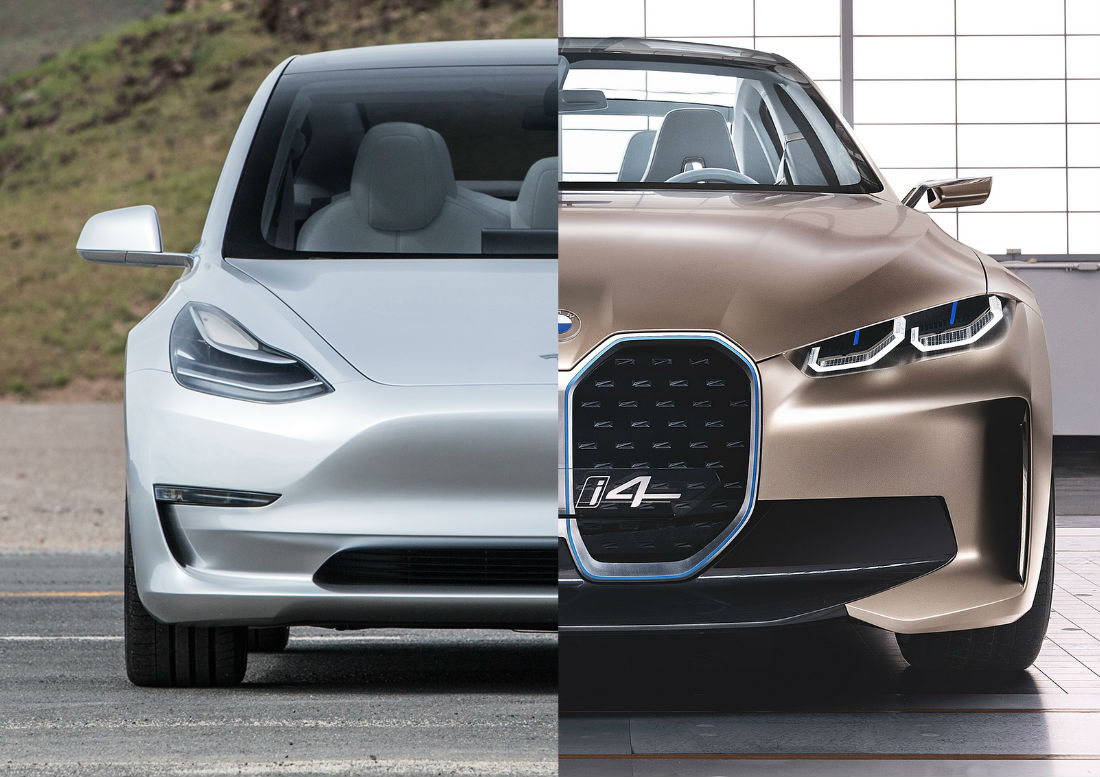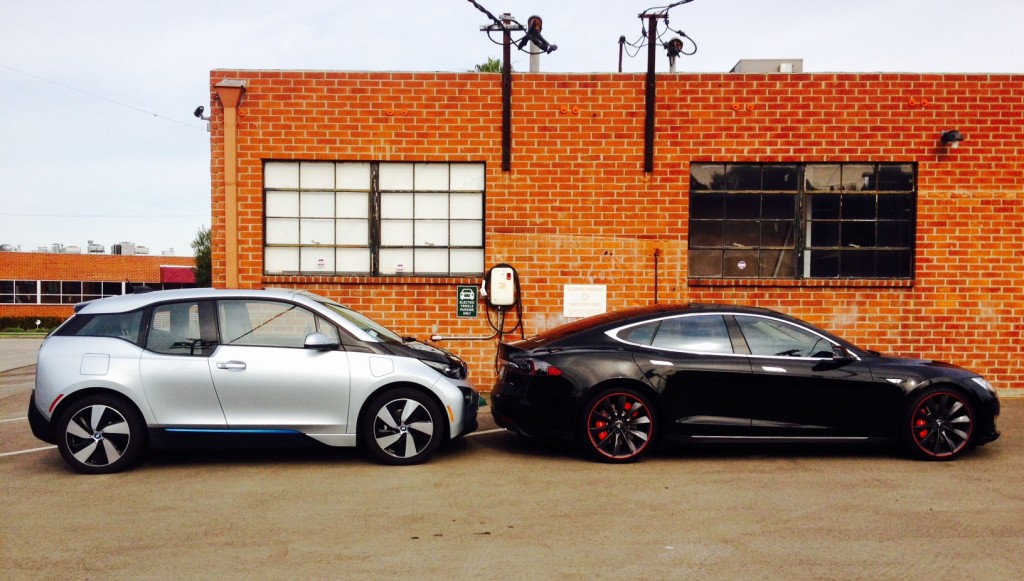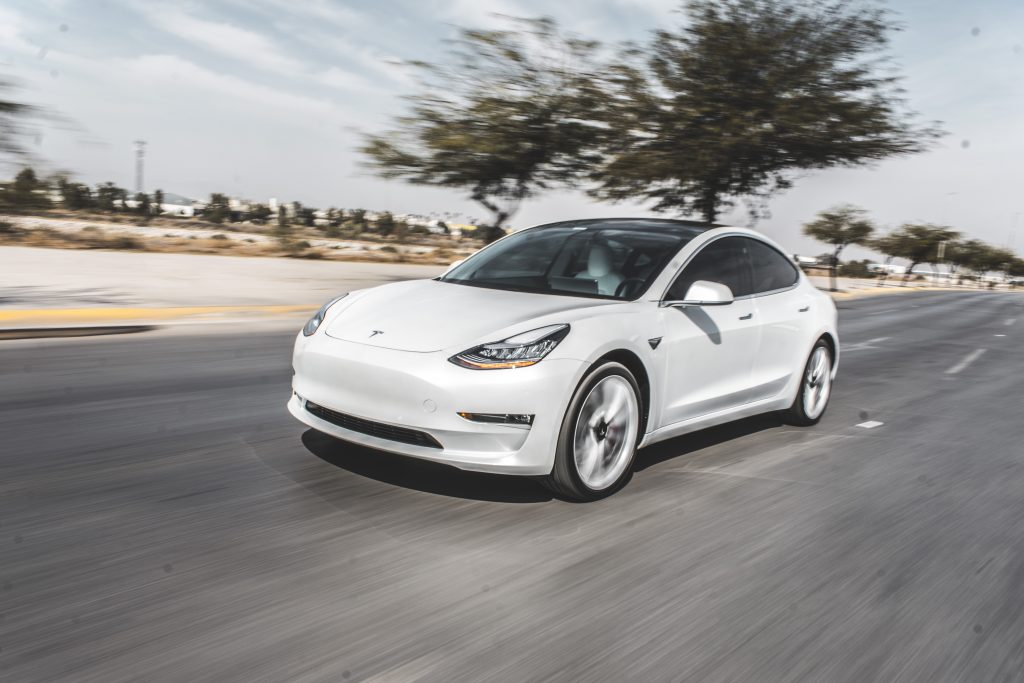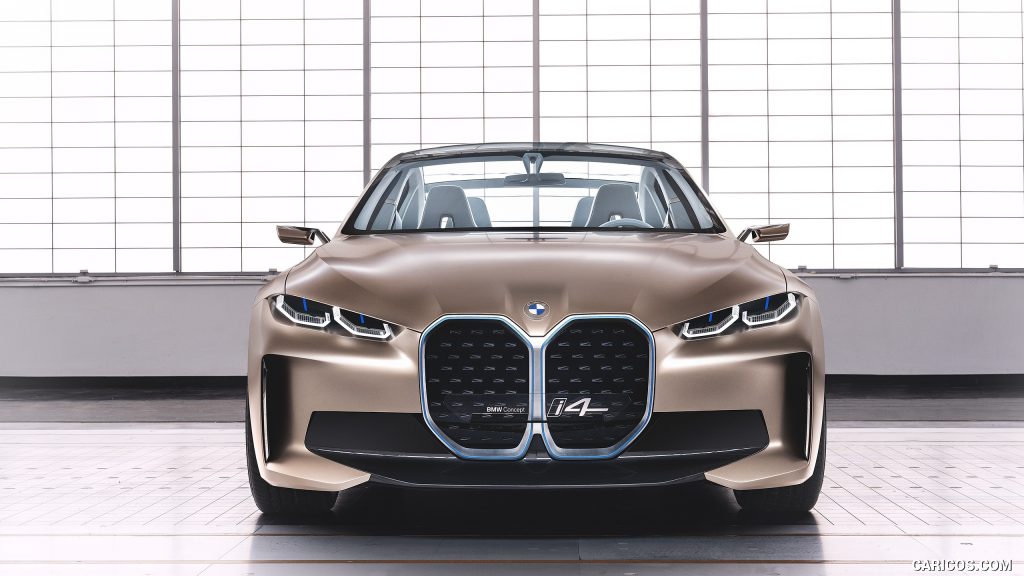

News
Tesla Model 3 vs BMW i4: How hubris is killing a potential ‘Tesla Killer’
Recently, BMW took the wraps off yet another one of its concept electric vehicles, the i4 sedan. The BMW i4 is poised to rival the Tesla Model 3, an electric car that is so disruptive, it is shaking up the midsize high-performance sedan market. Unfortunately for the German carmaker, one has to wonder if BMW’s efforts with the i4 are simply far too late.
Behind the possible clash between the Tesla Model 3 and the BMW i4 is a history that spans years, all the way back to 2013, when Tesla was just starting the production of its flagship Model S and the German automaker was coming up with the i3. But despite the two vehicles being all-electric cars, they could not be any more different.
Tesla designed the Model S as a sedan that can take on the Mercedes-Benz S-Class, and it has the looks, range, and performance to match. BMW, on the other hand, designed the i3 like a novelty vehicle, with a carbon fiber body, limited range, and performance that’s at home in inner-city streets. This distinction between the Model S and i3 foreshadowed the future of the two companies’ electric vehicle programs, as Tesla would follow up on the Model S with the Model X and Model 3, and BMW would end up being stuck with the i3 until today.

Yet despite having just one key pure electric car in its lineup, BMW has put a lot of effort in convincing the auto industry that it is taking electric vehicles seriously. Concept after concept was unveiled to much fanfare, but so far, none of the company’s fancy vehicles like the iNext have a legitimate release date. While this was happening, Tesla was growing, refining its processes, and making its vehicles like the Model 3 even better.
The Model 3 may not be the quickest vehicle in Tesla’s lineup, but it is the most disruptive. Priced aggressively and designed to take on the most established premium midsized sedans like the BMW 3-Series and the Mercedes-Benz C-Class, the Model 3 was poised to make waves, and make waves it did. The Model 3 Performance, the most powerful of the lineup, even managed to beat the legendary BMW M3 on the track, hands down. The idea of an electric sedan outperforming the M3 on the track would have probably warranted mockery had it been suggested during the days of the Model S and i3, but it is a painful truth that the German automaker has to swallow now.
It was not long before it was evident that the i3 won’t be enough to take on vehicles like the Model S or Model 3. Yet, BMW seemed to still take its sweet time developing its electric cars, with some executives even adopting the narrative that there is not enough demand for pure EVs anyway. It is then unsurprising that today, Tesla’s lead in electric mobility has become so stark, it is almost embarrassing for some legacy automakers like BMW.

When BMW announced the unveiling of its i4 concept on Twitter, the electric vehicle community immediately poked fun at the automaker for showing off yet another concept car. The car had impressive specs, though, with BMW stating that the i4’s single motor will generate about 530 hp, about on par with one of the automaker’s V8 engines. The i4 is pretty quick too, with a 0-62 mph time of about 4 seconds. Range-wise, estimates point to the i4 having about 270 miles in between charges.
While these specs are decent and a notable improvement over the i3, the i4 does show several signs suggesting that BMW is still not going all-in on electric cars. A look at the vehicle’s exterior alone shows that the i4 is still designed like a conventional car, with a long sloping hood that lacks any sort of frunk due to the space being allotted for electronics. Overall, the i4 boasts an attractive design that would likely end up being a template for the next-generation BMW 3-Series, but a ground-up EV it does not seem to be.
And here lies the issue with BMW so far. It appears that even after years of the i3 never really taking off, the company is still under the impression that it can ride the EV wave with a car that is just adequate in features and performance. Considering BMW’s long history as an automaker, such appears to be a big sign of hubris. And at this point in the EV race, that could be very costly.

BMW is one of three prolific auto houses in Germany, and so far, it is the one that seems to be lagging behind the most when it comes to electric vehicles. Daimler may be seeing challenges with the Mercedes-Benz EQC, but the company has some fallback in the company’s electric trucks like the Freightliner eCascadia, which only has a few rivals like the Tesla Semi.
Volkswagen has adopted a very aggressive strategy with its EV push. So serious is VW with its electric cars that the company’s CEO, Herbert Diess, is pretty much putting his career on the line to ensure that the automaker can roll out a mass-produced vehicle like the ID.3, a car that has the potential to be this generation’s Beetle. And then there’s BMW, still with its concepts, and a Model 3 competitor that is still over a year away at the best case scenario.
The term “Tesla Killer” has become ubiquitous with the number of electric cars that are being developed by legacy automakers. Yet over the years, each and every one of these alleged killers, from the Chevy Bolt to the Jaguar I-PACE, have proven to be incapable of outgunning Tesla’s electric cars in their own game. For the i4 to be a legitimate rival to the Model 3, it must beat Tesla with not just its badge’s pedigree. Otherwise, BMW may end up killing its “Tesla Killer” even before it had a chance to compete, thanks to an EV effort that is uninspired at best.
News
Tesla begins Robotaxi certification push in Arizona: report
Tesla seems serious about expanding its Robotaxi service to several states in the coming months.

Tesla has initiated discussions with Arizona transportation regulators to certify its driverless Robotaxi service in the state, as per a recent report from Bloomberg News. The move follows Tesla’s launch of its Robotaxi pilot program in Austin, Texas, as well as CEO Elon Musk’s recent comments about the service’s expansion in the Bay Area.
The Arizona Department of Transportation confirmed to Bloomberg that Tesla has reached out to begin the certification process for autonomous ride-sharing operations in the state. While details remain limited, the outreach suggests that Tesla is serious about expanding its driverless Robotaxi service to several territories in the coming months.
The Arizona development comes as Tesla prepares to expand its service area in Austin this weekend, as per CEO Elon Musk in a post on X. Musk also stated that Tesla is targeting the San Francisco Bay Area as its next major market, with a potential launch “in a month or two,” pending regulatory approvals.
Tesla first launched its autonomous ride-hailing program on June 22 in Austin with a small fleet of Model Y vehicles, accompanied by a Tesla employee in the passenger seat to monitor safety. While still classified as a test, Musk has said the program will expand to about 1,000 vehicles in the coming months. Tesla will later upgrade its Robotaxi fleet with the Cyercab, a two-seater that is designed without a steering wheel.
Sightings of Cybercab castings around the Giga Texas complex suggests that Tesla may be ramping the initial trial production of the self-driving two-seater. Tesla, for its part, has noted in the past that volume production of the Cybercab is expected to start sometime next year.
In California, Tesla has already applied for a transportation charter-party carrier permit from the state’s Public Utilities Commission. The company is reportedly taking a phased approach to operating in California, with the Robotaxi service starting with pre-arranged rides for employees in vehicles with safety drivers.
News
Tesla sets November 6 date for 2025 Annual Shareholder Meeting
The automaker announced the date on Thursday in a Form 8-K.

Tesla has scheduled its 2025 annual shareholder meeting for November 6, addressing investor concerns that the company was nearing a legal deadline to hold the event.
The automaker announced the date on Thursday in a Form 8-K submitted to the United States Securities and Exchange Commission (SEC). The company also listed a new proposal submission deadline of July 31 for items to be included in the proxy statement.
Tesla’s announcement followed calls from a group of 27 shareholders, including the leaders of large public pension funds, which urged Tesla’s board to formally set the meeting date, as noted in a report from The Wall Street Journal.
The group noted that under Texas law, where Tesla is now incorporated, companies must hold annual meetings within 13 months of the last one if requested by shareholders. Tesla’s previous annual shareholder meeting was held on June 13, 2024, which placed the July 13 deadline in focus.
Tesla originally stated in its 2024 annual report that it would file its proxy statement by the end of April. However, an amended filing on April 30 indicated that the Board of Directors had not yet finalized a meeting date, at least at the time.
The April filing also confirmed that Tesla’s board had formed a special committee to evaluate certain matters related to CEO Elon Musk’s compensation plan. Musk’s CEO performance award remains at the center of a lengthy legal dispute in Delaware, Tesla’s former state of incorporation.
Due to the aftermath of Musk’s legal dispute about his compensation plan in Delaware, he has not been paid for his work at Tesla for several years. Musk, for his part, has noted that he is more concerned about his voting stake in Tesla than his actual salary.
At last year’s annual meeting, TSLA shareholders voted to reapprove Elon Musk’s compensation plan and ratified Tesla’s decision to relocate its legal domicile from Delaware to Texas.
Elon Musk
Grok coming to Tesla vehicles next week “at the latest:” Elon Musk
Grok’s rollout to Tesla vehicles is expected to begin next week at the latest.

Elon Musk announced on Thursday that Grok, the large language model developed by his startup xAI, will soon be available in Tesla vehicles. Grok’s rollout to Tesla vehicles is expected to begin next week at the latest, further deepening the ties between the two Elon Musk-led companies.
Tesla–xAI synergy
Musk confirmed the news on X shortly after livestreaming the release of Grok 4, xAI’s latest large language model. “Grok is coming to Tesla vehicles very soon. Next week at the latest,” Musk wrote in a post on social media platform X.
During the livestream, Musk and several members of the xAI team highlighted several upgrades to Grok 4’s voice capabilities and performance metrics, positioning the LLM as competitive with top-tier models from OpenAI and Google.
The in-vehicle integration of Grok marks a new chapter in Tesla’s AI development. While Tesla has long relied on in-house systems for autonomous driving and energy optimization, Grok’s integration would introduce conversational AI directly into its vehicles’ user experience. This integration could potentially improve customer interaction inside Tesla vehicles.
xAI and Tesla’s collaborative footprint
Grok’s upcoming rollout to Tesla vehicles adds to a growing business relationship between Tesla and xAI. Earlier this year, Tesla disclosed that it generated $198.3 million in revenue from commercial, consulting, and support agreements with xAI, as noted in a report from Bloomberg News. A large portion of that amount, however, came from the sale of Megapack energy storage systems to the artificial intelligence startup.
In July 2023, Musk polled X users about whether Tesla should invest $5 billion in xAI. While no formal investment has been made so far, 68% of poll participants voted yes, and Musk has since stated that the idea would be discussed with Tesla’s board.
-

 Elon Musk1 week ago
Elon Musk1 week agoTesla investors will be shocked by Jim Cramer’s latest assessment
-

 Elon Musk21 hours ago
Elon Musk21 hours agoxAI launches Grok 4 with new $300/month SuperGrok Heavy subscription
-

 Elon Musk3 days ago
Elon Musk3 days agoElon Musk confirms Grok 4 launch on July 9 with livestream event
-

 News7 days ago
News7 days agoTesla Model 3 ranks as the safest new car in Europe for 2025, per Euro NCAP tests
-

 Elon Musk2 weeks ago
Elon Musk2 weeks agoA Tesla just delivered itself to a customer autonomously, Elon Musk confirms
-

 Elon Musk1 week ago
Elon Musk1 week agoxAI’s Memphis data center receives air permit despite community criticism
-

 Elon Musk2 weeks ago
Elon Musk2 weeks agoTesla’s Omead Afshar, known as Elon Musk’s right-hand man, leaves company: reports
-

 News2 weeks ago
News2 weeks agoXiaomi CEO congratulates Tesla on first FSD delivery: “We have to continue learning!”
















